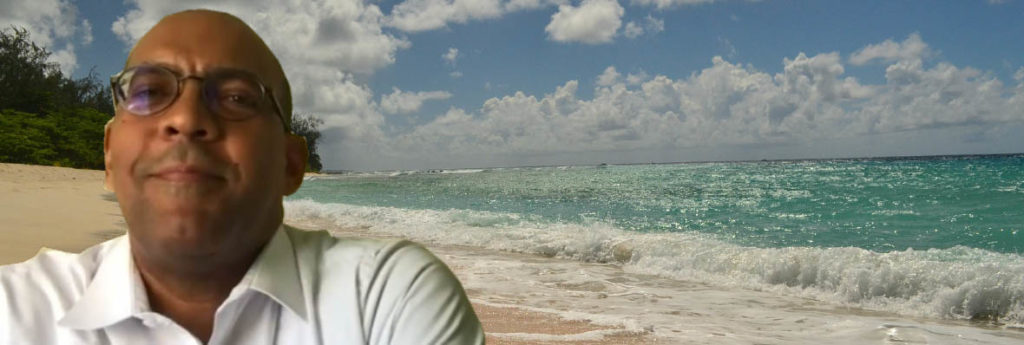It wasn’t the kind of update Kerrie Symmonds expected to be giving. Instead of addressing the travel trade in person at the cancelled Connect Barbados travel marketplace at the Hilton Barbados in Bridgetown in late April, the country’s tourism minister instead could only have a virtual conversation with reporters from around the world about the island’s prospects resulting from the COVID-19 crisis.
Instead of deep-diving into travel trends, the rise or fall of the dollar or, perhaps, weather-related worries, the minister was forced to focus on recovery for an essential industry in Barbados that makes up 40 percent of the annual GDP and in which 30 percent of the workforce is either directly or indirectly related to tourism.
And rather than revelling in record tourist arrivals in 2019, he mused about trying to keep Barbados top of mind with potential visitors who are “still at home thinking about where they want to go and what they want to do when this is all blown over…”
“We were really on a fantastic growth trajectory prior to COVID-19… but that has substantially been derailed – and that has perhaps been the most difficult part of it for the industry both in the context of the impact from a health care and crisis perspective and a strictly economic point of view,” Symmonds noted.
At the time of the interview (April 28), Barbados had registered 80 cases of COVID-19, of which almost half had recovered, but six had died.
As a result, Symmonds says that Barbados has had to shift “already scarce resources” into health care to help cope with the crisis – a situation that is exasperated by a disruption in the global supply chain that disfavours small Caribbean countries when confronted by astronomical demand elsewhere.
“There is a haunting refrain of inequality, so that even as a small island like Barbados tries to do the right things in terms of making sure that we readjust our finances to make sure that we can better deal with the onset of the COVID-19 crisis, there is the inequality that we confront and in which we are powerless… We cannot possibly produce our own ventilators or make our own medicine, etc., and that means that we are at the back of the line to get essentials to protect our people and put us in the position to kick start the economy.”
As for tourism specifically, Symmonds points out that Barbados would expect about 55 aircraft “movements” every day at this time of year and “that has all dried up – and all the business and commercial activity that is attendant to that has dried up. The long-term stay sector, the hotels, have largely all closed; grand transportation has come to a halt… all the companies related to the tourism industry sector have all been brought to a standstill…”
The result has been a 25 percent increase in unemployment in the past three weeks with the additional effect of substantial insurance claims for the government.
Like elsewhere, the government has initiated special measures across the economy, such as debt relief and loan forbearance to help individuals and business survive the pandemic, as well as tourism-specific programs like a small hotel investment fund “because those are the ones which, quite frankly, are most in danger of going under.”
Symmonds says hotels will be able to access funds to help renovate, for example, in order to be more attractive and competitive when tourism resumes.
The government has also created a training task force to help improve the skills of hotel workers, improve access for disabled visitors, heighten hygiene standards, and otherwise use this downtime “constructively and wisely.”
CRUISE
Barbados has also been careful to be cognizant of the impact of the coronavirus situation on its “critical” cruise business, thereby taking a “stout and robust” position that when in the early days of the crisis other countries were reacting to cruise ships “with a certain degree of horror and, in some instances, refusing access to their shores,” the government “took a conscious and deliberate decision that we would not do that,” says Symmonds.
Instead, Barbados “would treat the cruise sector as partners” and allow safe harbour to vessels, some of which were not otherwise even intending to visit the island, as well as allowing passengers and crew to be repatriated.
Some 16 ships remain offshore at the island waiting for global restrictions to ease.
RECOVERY
As for the future, Symmonds expects re-emergence to be “subdued” for at least three to six months, but that the island will be ready when international markets re-open.
The first phase, says the minister, is likely to come from the long-stay villa market, which is associated with luxury and high-end clients who often have their own private jets for transport and don’t depend on commercial air.
At the same time, the economy, such as restaurants, will continue to re-open in phases “in a limited way.”
Currently, an island-wide curfew is scheduled to end on May 3, however a state of emergency remains in effect until June 30.
Still, Symmonds says, “I foresee that summer is going to be a challenge for the industry. Beyond summer I think is the reality (subject to what happens in our source markets). We walk with caution but are very optimistic and prepared for the worst. It might be more of a reality to think in terms of winter.”

